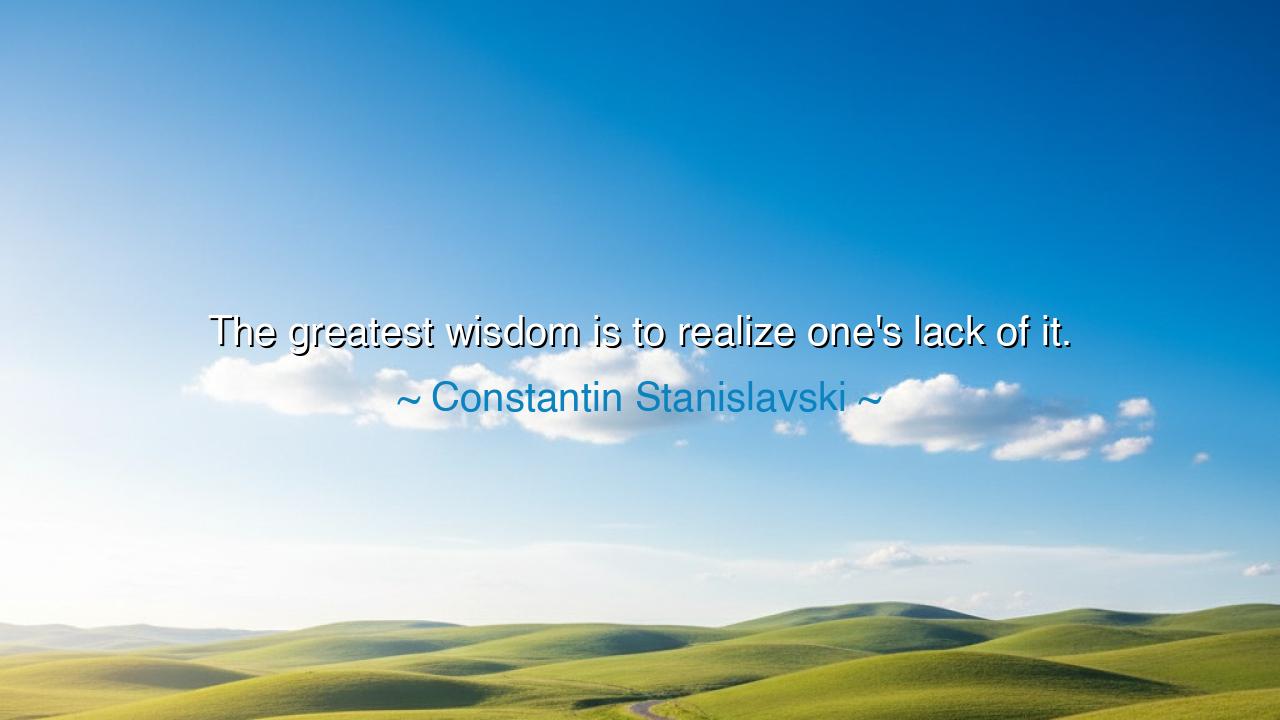
The greatest wisdom is to realize one's lack of it.






“The greatest wisdom is to realize one's lack of it.” These powerful words by Constantin Stanislavski speak to a profound and often elusive truth: true wisdom begins not in the accumulation of knowledge, but in the humble recognition of our ignorance. Stanislavski, a master of the craft of acting, understood that an actor's greatness comes not from knowing all the answers, but from understanding the depth of what they do not know. It is in the awareness of one's limitations that the seed of growth is planted. The moment we acknowledge our lack of wisdom, we open ourselves to deeper learning, growth, and transformation.
The ancients knew well the importance of recognizing one’s own ignorance as the first step toward true wisdom. Socrates, the great philosopher of Athens, famously proclaimed, “I know that I am intelligent, because I know that I know nothing.” In this declaration, Socrates captured the essence of what Stanislavski was teaching: that true wisdom lies not in the arrogance of having all the answers, but in the humble realization of the vast unknowns before us. Socrates saw that wisdom begins with the admission of our ignorance, for it is only through this recognition that we are open to the pursuit of greater understanding.
Consider the life of Leonardo da Vinci, whose genius is still revered to this day. Despite his unparalleled achievements in art, science, and invention, da Vinci understood that he could never know everything. In his notebooks, he wrote extensively about his desire to understand the universe, but also about his awareness of the limitations of his own knowledge. Leonardo's greatness lay not just in his immense talents, but in his ceaseless curiosity, and his ability to embrace his ignorance as fuel for further exploration. His acknowledgment of what he did not know spurred him to push boundaries and uncover truths that had yet to be revealed.
The wisdom of Socrates and da Vinci is echoed in Stanislavski's approach to acting. To become a truly great actor, one must first understand the limitations of their own abilities. Stanislavski taught that the actor's craft is a constant process of self-discovery. To portray a character authentically, an actor must first realize the gaps in their understanding of the human condition and approach their work with an open heart and mind. The actor who believes they know everything is the one most likely to fall into stagnation, while the one who recognizes their ignorance remains ever-growing, ever-evolving in their craft.
This truth about wisdom extends beyond the stage and into all aspects of life. The greatest leaders, philosophers, and thinkers throughout history have all demonstrated a profound understanding of their own limitations. Mahatma Gandhi, for example, was a man of extraordinary conviction and strength, but he never claimed to know everything. His ability to listen, to learn from others, and to constantly refine his thoughts and actions speaks to Stanislavski's belief in the power of self-awareness. Gandhi knew that to truly lead, one must acknowledge one’s lack of wisdom and strive, always, to grow and adapt.
In conclusion, Stanislavski's words remind us that wisdom is not about claiming mastery over all things, but about recognizing the vastness of what we do not know. The greatest wisdom is found in humility, in the acknowledgment of our ignorance, and in the continuous pursuit of learning and self-discovery. It is this humble journey that leads us toward deeper understanding and, ultimately, true growth. May we all walk the path of self-awareness, embracing our limitations and using them as the foundation for greater wisdom.






QNQuoc Nguyen
Reading this makes me reflect on personal and societal arrogance. Could much conflict and error arise from people believing they know more than they do? I also think about education—should learning focus more on teaching students to recognize their gaps in understanding rather than just accumulating facts? How can this insight be cultivated effectively to create wiser, more reflective individuals in both private and public spheres?
DNAnh thu day Nhe
This perspective resonates with philosophical ideas about the limits of human knowledge. I wonder if this self-awareness is the first step toward genuine wisdom, or if it can also lead to paralysis and indecision. How do we balance recognizing our ignorance with the need to act confidently in uncertain situations? Could understanding the limits of our knowledge improve decision-making in leadership, science, and daily life?
UGUser Google
I feel a mix of reassurance and discomfort reading this. It seems to suggest that acknowledging ignorance is a form of strength, yet it also exposes vulnerability. How can society encourage people to embrace this awareness without feeling inadequate? I’m curious whether admitting what we don’t know could foster better collaboration, open-mindedness, and intellectual curiosity, rather than being seen as a weakness or failure.
GDGold D.dragon
This quote makes me reflect on humility and self-awareness as central to personal growth. Is it possible that the recognition of one’s own limitations is more valuable than accumulating knowledge alone? I also wonder how this idea applies in professional and creative fields, where overconfidence can lead to mistakes. Could accepting our lack of wisdom actually make us better learners and more adaptable individuals in life?